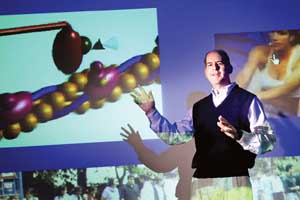Martin Feder, Professor in Organismal Biology & Anatomy
By Steve KoppesNews Office
 Martin Feder | |
Martin Feder had tried for years to explain to the students in his undergraduate physiology course how hemoglobin in the bloodstream takes oxygen from the lungs and delivers it to cells throughout the body.
“It’s a fairly complex interaction of four different protein subunits and the chemical groups to which they are attached,” said Feder, Professor in Organismal Biology & Anatomy. He tried blackboard diagrams, displaying various models and assigning special readings. “It never really got across.”
Then he put together a multimedia electronic demonstration, complete with sound effects and moving images to describe the process. “Everybody got it,” he said. Today, Feder gets something of his own to show for the efforts he has devoted to cracking tough instructional problems: a Llewellyn John and Harriet Manchester Quantrell Award for Excellence in Undergraduate Teaching.
His approach to teaching might be summed up in a quote from the novel Cat’s Cradle, written by alumnus Kurt Vonnegut (A.M.,’71). “Any scientist who cannot explain to an 8-year-old what he is doing is a charlatan,” Vonnegut wrote. In other words, Feder considers it his job to adequately explain his subject to students, not his students’ job to make sense of his explanations.
Feder’s early mastery of e-mail, the Web and Chalk (the electronic learning system provided to faculty by Networking Services and Information Technologies) has helped him to better communicate complex topics to his students. He embraced these tools early on.
When Feder first began using e-mail to engage the students in a continuous learning dialogue, it was such a new tool that he had to show many students how to use it. Furthermore, he was the first faculty member in the BSD to have a course Web site. Chalk, meanwhile, enabled Feder to convey the dynamism of physiology in ways that far exceeded conventional instruction at the blackboard.
His approach to teaching also has been influenced by George Bartholomew, a UCLA biologist, member of the National Academy of Sciences and recipient of a Chicago honorary degree. According to Bartholomew, “Every level of biological organization finds its mechanism at lower levels of biological organization and its significance at higher levels of biological organization.”
That scientific worldview makes physiology the conduit through which to connect to other disciplines, Feder maintains. The way he sees it, human knowledge spans a continuum that grades almost imperceptibly from one body of knowledge into another. “In the life sciences, you can no longer tell where molecular biology leaves off and genetics begins, or where evolutionary biology leaves off and physiology begins. It’s all a continuum,” Feder said.
And at the center of this continuum is physiology, with molecules, cells, tissues, organs and organ systems on one end, and populations, communities and ecosystems on the other. “In order to understand the center, you have to understand both ends,” he said.
Feder has long been a mainstay of undergraduate education at the University. He has taught undergraduate physiology in one form or another since 1979. He has co-authored 14 papers with undergraduates since 1985. And he has mentored students who continued their studies at medical schools and Ph.D. programs at Harvard University, Stanford University, the University of California, Berkeley, and elsewhere.
On the administrative end, Feder served as Master of the Biological Sciences Collegiate Division from 1988 to 1991. During that time he obtained the first in a continuous series of annual grants for undergraduate education and research from the Howard Hughes Medical Institute.
The purpose of the grants is to entice more students into the life sciences. “It’s critical for the survival of the field that we love to have people coming into it,” Feder said.
![[Chronicle]](/images/sidebar_header_oct06.gif)